Key Takeaways:
- Hamas and other Palestinian militias are exploiting the Israeli hostages they are holding to ensure that Hamas and its partners are involved in any negotiations about the future of the Gaza Strip. Hamas having a role in the future of the strip is incompatible with Israel’s stated war objectives of destroying Hamas, demilitarizing Gaza, and deradicalizing “Palestinian society.”
- Hamas fighters attacked Israeli forces conducting holding operations in Beit Hanoun. CTP-ISW assessed on December 20 that the IDF transitioned to a hold phase in Beit Hanoun.
- Hamas and its militia allies continued to defend against Israeli clearing operations in Jabalia. The IDF reported that one of Hamas’ battalions used Indonesian Hospital in Jabalia as a headquarters.
- The IDF continued clearing operations in Daraj wal Tuffah, Gaza City. Palestinian militias continued to defend against Israeli clearing operations in Daraj wal Tuffah.
- Palestinian militias continued to try to defend against Israeli clearing operations in Khan Younis. Palestinian militias used mortars, small arms fire, and anti-tank rockets to defend against the Israeli advances.
- A Hamas security official shot and killed a fifteen-year-old Palestinian boy at an aid distribution site in Rafah, demonstrating the continued breakdown of governance and social order across the Gaza Strip.
- Palestinian militias conducted at least two mortar attacks from the Gaza Strip targeting southern Israel on December 25 and five rocket attacks on December 26.
- Israeli forces clashed with Palestinian fighters across the West Bank in nine locations on December 25 and in four locations on December 26.
- Iranian-backed militias, including Lebanese Hezbollah, conducted from southern Lebanon into northern Israel 10 attacks on December 25 and nine attacks on December 26.
- Israeli media reported that LH began withdrawing many of its forces, including Radwan special operations forces, from the Israel-Lebanon border.
- The United States conducted airstrikes targeting three Kataib Hezbollah drone facilities in Hillah, Babil Province, Iraq, in response to a KH drone attack that wounded three US military personnel at Erbil International Airport earlier that day.
- The Islamic Resistance in Iraq—a coalition of Iranian-backed Iraqi militias—claimed responsibility for three attacks targeting US positions in Iraq and Syria.
- Iranian Supreme National Defense University President IRGC Brigadier General Esmail Ahmadi Moghaddam discussed security and counterterrorism cooperation with Iraqi Popular Mobilization Forces Chairman Faleh al Fayyadh in Baghdad.
- Israel was likely responsible for an airstrike on the IRGC military headquarters near Sayyidah Zainab, Syria, killing senior IRGC officer Brigadier General Razi Mousavi. The IRGC and senior Iranian officials vowed that Iran would retaliate against Israel for Mousavi’s death.
- The Houthis attacked two vessels in the Red Sea as part of the ongoing anti-shipping attack campaign that they and Iran have conducted around the Bab al Mandeb in recent weeks. The IDF intercepted at least one Houthi drone targeting southern Israel.
Hamas and other Palestinian militias are exploiting the Israeli hostages they are holding to ensure that Hamas and its partners are involved in any negotiations about the future of the Gaza Strip. Beginning international negotiations on what the Gaza Strip will look like after the war with discussions on hostage releases has created the opportunity for Hamas and its allies to insert themselves into the discussion on the future of the strip. Hamas and its allies seek to use the hostages as leverage to get Israel to leave the Gaza Strip and end the war on terms favorable to Hamas. Hamas and Palestinian Islamic Jihad rejected an Egyptian three-phase peace proposal on December 25 that sought to create a long-term ceasefire likely because it did not guarantee an immediate Israeli withdrawal from the Gaza Strip.[i] The first phase of the agreement would have Hamas release 40 Israeli hostages in exchange for Israeli releasing 140 Palestinian prisoners.[ii] This phase also included the withdrawal of the IDF only from residential areas in the Gaza Strip.[iii] Releasing hostages prior to a complete Israeli withdrawal deprives Hamas and its allies of some of their negotiating leverage. The second and third phases of the agreement would have Hamas release female and then male soldiers held hostage in return for Israel releasing additional Palestinian prisoners.[iv] The third phase would include the formation of a transitional government in the Gaza Strip that would include “various Palestinian factions, including Hamas.”[v] Hamas officials have said repeatedly in recent days that they would refuse to release any hostages prior to a complete ceasefire that forces Israel to withdraw from the Gaza Strip, leaving Hamas in power.[vi] Hamas and its allies are thus exploiting the hostages to ensure it will remain in power after the end of Israeli military operations in the Gaza Strip.
Hamas’ effort to secure its role in the future of the Gaza Strip is incompatible with Israel’s stated war objectives of destroying Hamas, demilitarizing Gaza, and deradicalizing “Palestinian society.”[vii] Israeli Prime Minister Benjamin Netanyahu reiterated these aims in an op-ed on December 26.[viii] Any agreement that maintains Hamas’ military and political role in the Gaza Strip would be tantamount to Israel’s defeat in this war because it would preserve Hamas as a governing body and military force and provide Hamas safe haven to reconstitute itself and threaten Israel again in the future. Hamas remains resilient and able to reconstitute its military capabilities, despite its military losses in the war thus far.[ix] Israel’s stated war goals are meant to prevent Hamas’ reconstitution by destroying Hamas as a governing body and military force. Israeli officials, including Netanyahu, have highlighted that Israel will need to fight a “prolonged” war to achieve these objectives.[x]
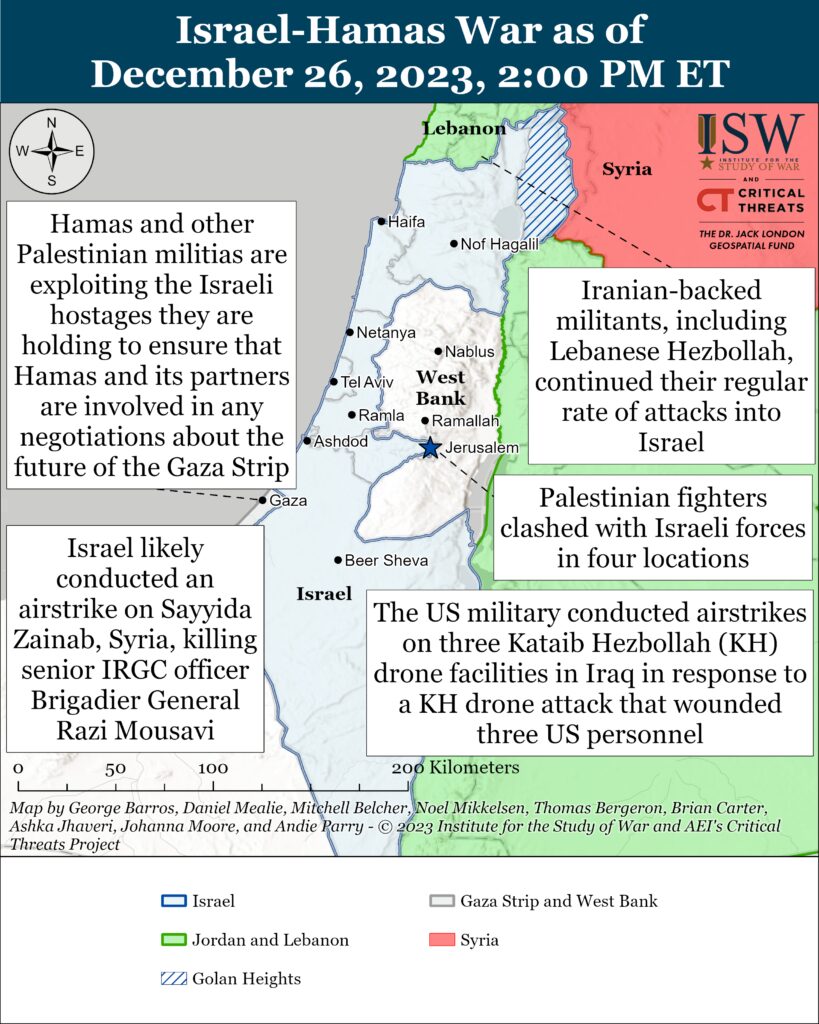
Gaza Strip
Axis of Resistance campaign objectives:
Erode the will of the Israeli political establishment and public to launch and sustain a major ground operation into the Gaza Strip
Degrade IDF material and morale around the Gaza Strip.Hamas fighters attacked Israeli forces conducting holding operations in Beit Hanoun on December 26. Hamas fighters detonated an improvised explosive device (IED) targeting Israeli forces west of Beit Hanoun on December 26.[xi] The IDF said on December 18 that it destroyed Hamas’ Beit Hanoun Battalion.[xii] CTP-ISW assessed on December 20 that the IDF transitioned to a hold phase in Beit Hanoun.[xiii] Violence decreases during a hold phase but is not absent, as the holding force seeks the complete destruction of the enemy force.[xiv]
Hamas and its militia allies continued to defend against Israeli clearing operations in Jabalia on December 25 and 26. Palestinian militias ambushed Israeli forces using IEDs, rocket-propelled grenades, and small arms.[xv] Hamas said that it targeted two separate Israeli combat outposts with thermobaric rockets on December 25.[xvi] Palestinian Islamic Jihad (PIJ) reported that that it used tandem charge rockets to attack advancing Israeli armor in Jabalia on December 26.[xvii] Hamas and PIJ also conducted a combined complex ambush using standard and thermobaric rockets against Israeli forces sheltering in a home in Jabalia city.[xviii] The IDF 261st Brigade engaged a Hamas cell that attempted to detonate an IED targeting an IDF tank in Jabalia on December 26.[xix] Israeli air and artillery support targeted and killed the enemy Hamas cell.[xx]
The IDF reported on December 26 that one of Hamas’ battalions used Indonesian Hospital in Jabalia as a headquarters. The IDF said that its 551st Brigade searched the grounds of the Indonesian Hospital and discovered a Toyota Corolla belonging to the family of one of the Israeli hostages.[xxi] The IDF reported that it found “bloodstains” and “RPG remains” in the vehicle, adding that the presence of the vehicle at the hospital connects the hospital to Hamas’ October 7 attack.[xxii] The IDF said that the hospital was a “strategic center of the underground infrastructure” for one of the Hamas battalions operating in Jabalia.[xxiii] The IDF was likely referring to the Khalifa (Jabalia Camp) Battalion, given that the Indonesian hospital is in the Jabalia refugee camp where this battalion operates.[xxiv]
The IDF continued clearing operations in Daraj wal Tuffah, Gaza City, on December 26. The IDF cleared two schools and seized “dozens” of IEDs in UN Relief and Works Agency bags.[xxv] The IDF also seized rifles and suicide vests. Israeli forces captured grenades, uniforms of Hamas elite forces, and an IED during a separate clearing operation.[xxvi]
Palestinian militias continued to defend against Israeli clearing operations in Daraj wal Tuffah on December 25. The al Qassem Brigades—the military wing of Hamas—and al Quds Brigades—the military wing of PIJ—used snipers and anti-tank rockets against Israeli dismounted infantry and armor in the neighborhood.[xxvii]
The IDF said that it expanded clearing operations in Bureij in the central Gaza Strip targeting Hamas’ Bureij Battalion on December 26. The IDF said that all four battalions in Hamas’ Central Brigade, of which the Bureij Battalion is apart, have sustained “some damage” but are “largely functioning.”[xxviii] The IDF killed the Central Brigade commander in mid-October, but his deputy likely commands the brigade now given that Hamas has a conventional military structure.[xxix] Hamas and its militia allies attempted to defend against the IDF’s advance. The al Qassem Brigades detonated a booby-trapped tunnel targeting Israeli soldiers east of Bureij, and the National Resistance Brigades mortared Israeli forces near Abu Mutaybaq crossing.[xxx] The al Qassem Brigades also fired anti-tank rockets targeting advancing Israeli armor.[xxxi]
PIJ mortared advancing Israeli units near Juhor ad Dik, northeast of Bureij, on December 26.[xxxii]
Palestinian militias continued to try to defend against Israeli clearing operations in Khan Younis on December 25 and 26. Palestinian militias used mortars, small arms fire, and anti-tank rockets to defend against the Israeli advances. The al Qassem Brigades claimed seven attacks using mortars and anti-tank rockets on December 25 and 26, targeting Israeli forces north and east of Khan Younis city.[xxxiii] The al Quds Brigades said that its forces engaged in “heavy fighting” against IDF forces north and east of the city.[xxxiv] The Abu Ali Mustafa Brigades, the al Aqsa Martyrs’ Brigades, and the National Resistance Brigades similarly attempted to defend against Israeli advances north of Khan Younis on December 25 and 26.[xxxv]
The IDF 4th Brigade Combat Team (BCT) destroyed “dozens of tunnel shafts” and discovered and destroyed a weapons factory in Khan Younis on December 25.[xxxvi] The IDF also said the 4th BCT destroyed a “concrete factory” that Hamas used to manufacture concrete for building tunnels.[xxxvii] The IDF 7th Brigade called in airstrikes targeting a group of Hamas fighters in Khan Younis on December 26, killing 10.[xxxviii]
Hamas’ political leader in the Gaza Strip, Yahya Sinwar, said that Hamas is inflicting “heavy [Israeli] losses” and that the al Qassem Brigades “destroyed” the IDF and will “crush it.” Sinwar claimed that Hamas forces killed at least 1,650 Israeli soldiers and permanently disabled 1,650 more.[xxxix] He added that Hamas has destroyed 750 IDF vehicles “completely or partially.” Sinwar provided no evidence to support his assertions and was likely exaggerating dramatically to frame Hamas as performing better militarily than it actually is. The IDF reported that 161 soldiers have been killed in action as of December 26.[xl]
A Hamas security official shot and killed a fifteen-year-old Palestinian boy at an aid distribution site in Rafah on December 24, demonstrating the continued breakdown of governance and social order across the Gaza Strip.[xli] The killing sparked clashes between Hamas security officers and the boy’s family in Tal al Sultan. A crowd formed after the killing, burning a Hamas police station and demanding revenge for the boy’s death.[xlii] A separate video showed plainclothes Hamas officers beating an individual with a stick in Khan Younis.[xliii] These reports are consistent with the Associated Press’s November 10 reporting, which noted that the strip’s society was “fraying” and that the population was beginning to push back against Hamas’ rule in the southern Gaza Strip.[xliv]
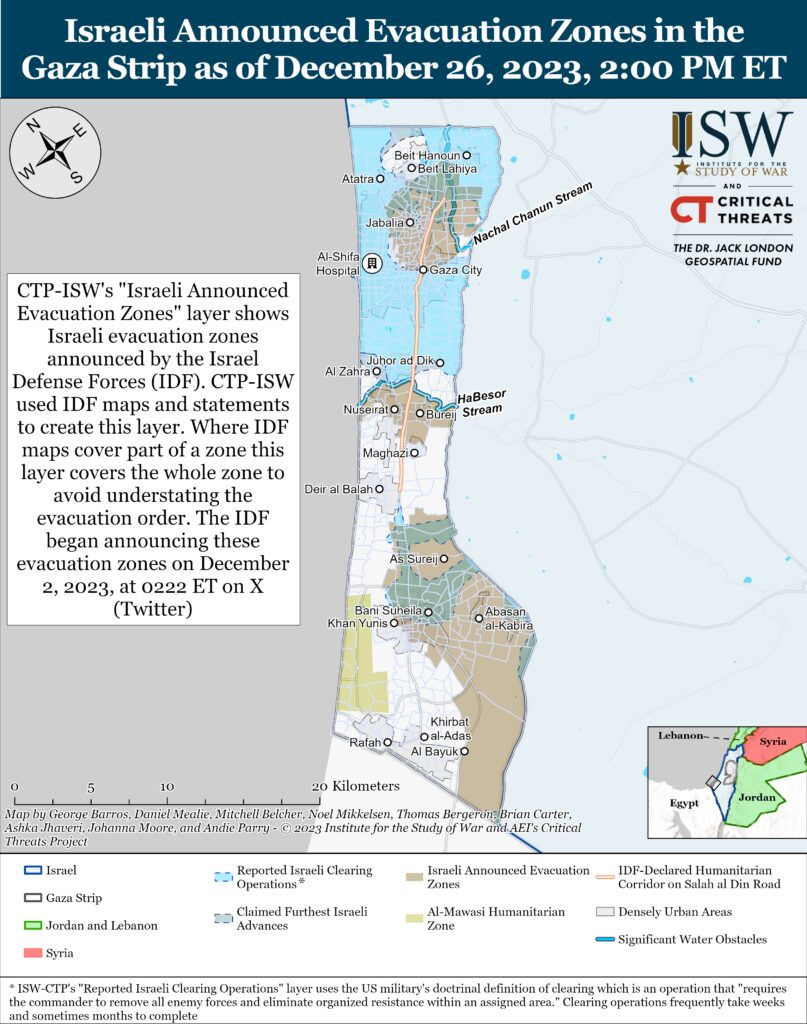
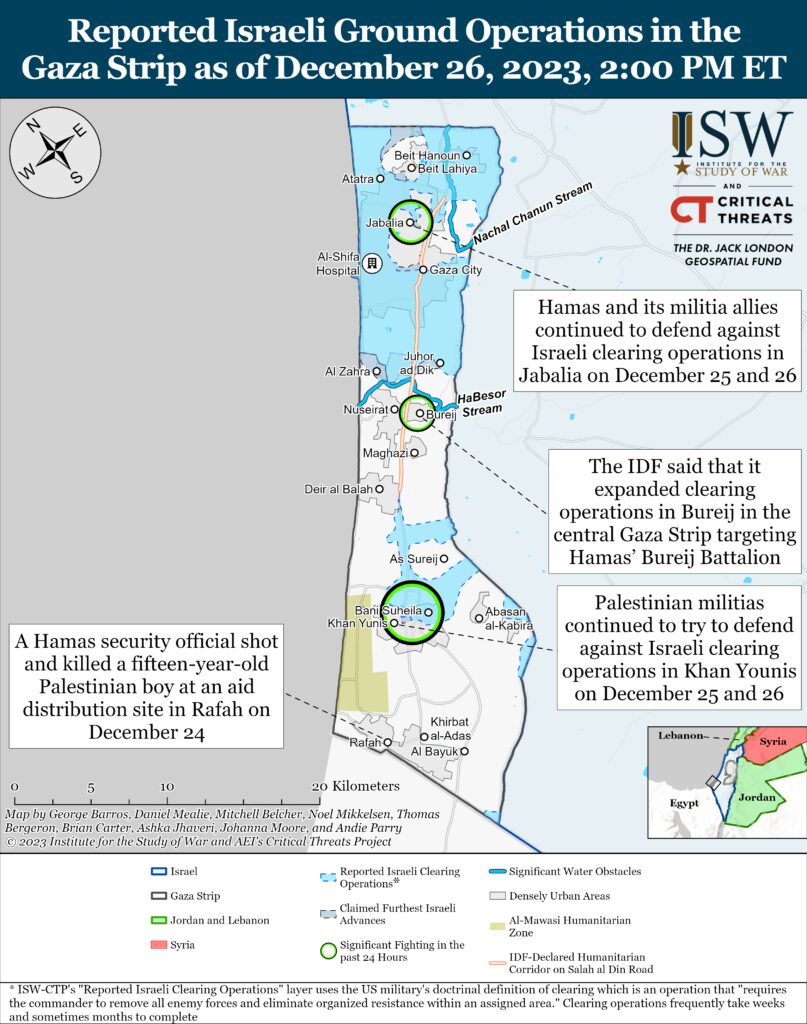
Palestinian militias conducted at least two mortar attacks from the Gaza Strip targeting southern Israel on December 25 and five rocket attacks on December 26. The al Quds Brigades and the National Resistance Brigades—the militant wing of the Democratic Front for the Liberation of Palestine (DFLP)—claimed one mortar attack each targeting southern Israel on December 25.[xlv] The al Quds Brigades claimed five more rocket attacks targeting southern Israel on December 26.[xlvi]
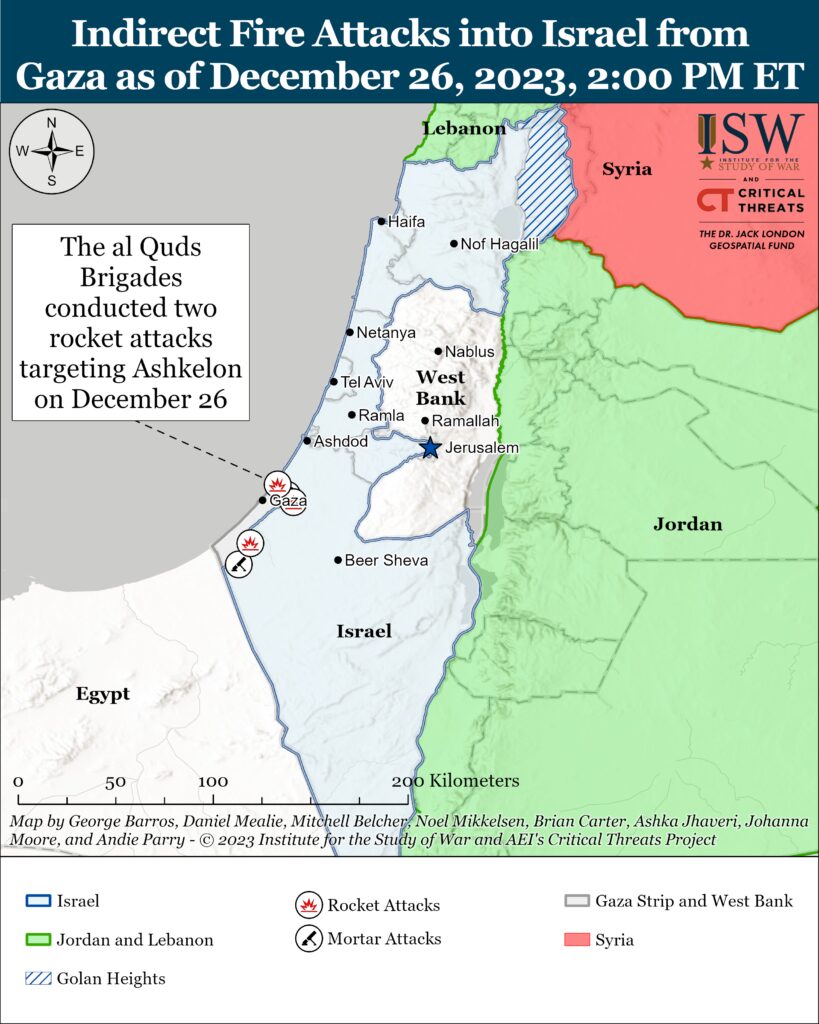
Recorded reports of rocket attacks; CTP-ISW cannot independently verify impact.
West Bank
Axis of Resistance campaign objectives:
Draw IDF assets and resources toward the West Bank and fix them thereIsraeli forces clashed with Palestinian fighters in nine locations across the West Bank on December 25.[xlvii] Palestinian fighters used a combination of IEDs and small arms in three of the nine clashes.[xlviii] Palestinian militias also detonated two separate IEDs targeting Israeli forces in near Ramallah and Bethlehem.[xlix] Al Aqsa Martyrs’ Brigades fighters fired small arms targeting Israeli forces in Tulkarm, Jenin, and Nablus on December 25.[l] Israeli forces arrested 11 people and confiscated weapons and cars in overnight raids throughout the West Bank on December 25.[li]
Israeli forces clashed with Palestinian fighters in four locations across the West Bank on December 26.[lii] Palestinian fighters used a combination of IEDs and small arms in three of the four clashes.[liii] Palestinian media said that Israeli forces blew up three houses in Nour Shams refugee camp.[liv] The IDF said its forces uncovered IEDs, an IED manufacturing site, makeshift rockets, and small arms in the camp.[lv]
Israeli forces arrested several senior Popular Front for the Liberation of Palestine (PFLP) militia in overnight raids in Ramallah on December 26.[lvi] The PFLP’s Office of Martyrs, Prisoners, and Wounded said that the arrests were an Israeli attempt to empty the West Bank of any national or political mobilization and that the arrests would only lead to “adverse results.”[lvii] Palestinians demonstrated in support of the Gaza Strip and Palestinian prisoners in Bethlehem and Nablus on December 26.[lviii] Several civil society and political groups, including Hamas’ political wing, called for mass demonstrations in the West Bank on December 26.[lix]
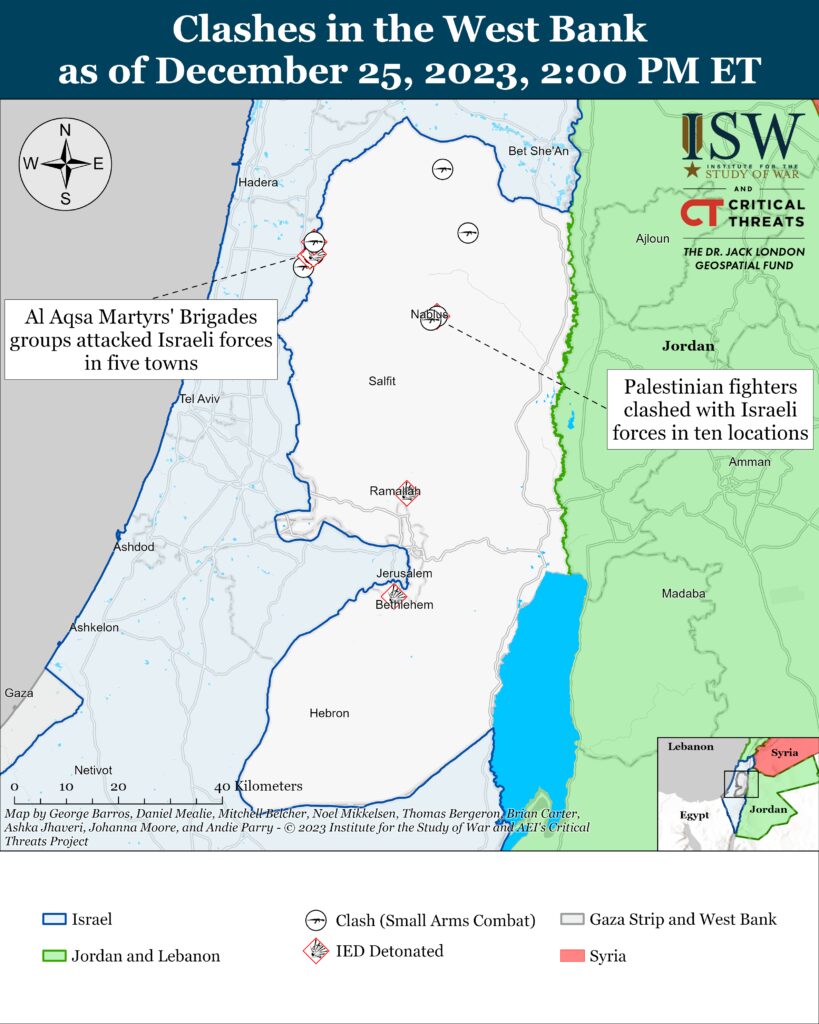
This map is not an exhaustive depiction of clashes and demonstrations in the West Bank.
Southern Lebanon and Golan Heights
Axis of Resistance campaign objectives:
Draw IDF assets and resources toward northern Israel and fix them there
Set conditions for successive campaigns into northern IsraelIranian-backed militias, including Lebanese Hezbollah (LH), conducted 10 attacks from southern Lebanon into northern Israel on December 25.[lx] LH claimed responsibility for eight of these attacks, targeting civilian and military sites. LH used an anti-tank guided missile (ATGM) in at least one of the attacks.[lxi] The al Qassem Brigades separately conducted an indirect fire attack targeting Israeli forces in northern Israel.[lxii]
Iranian-backed militias, including LH, conducted another nine attacks from southern Lebanon into northern Israel on December 26.[lxiii] LH claimed responsibility for eight of these attacks, targeting military sites. LH used an ATGM in at least one of the attacks and a Burkan short-range rocket in at least one of the attacks.[lxiv] LH also conducted a drone attack on an Israeli military site.[lxv]
Unspecified militants separately fired a surface-to-air missile targeting an IDF aircraft around the Israel-Lebanon border.[lxvi]
Israeli media reported on December 24 that LH began withdrawing many of its forces, including Radwan special operations forces, from the Israel-Lebanon border.[lxvii] Israeli officials told Israeli media that it is not clear for how long these LH forces will remain deployed away from the border, however. Israeli media attributed the withdrawal to the high rate of casualties that LH forces have incurred.
CTP-ISW is considering the hypothesis that LH Secretary General Hassan Nasrallah ordered the withdrawals to alleviate Israeli concerns about the threat that LH poses. Israeli officials have expressed concerns in recent weeks about the potential for LH to conduct an attack into Israel similar to what Hamas did on October 7.[lxviii] Israeli officials have accordingly discussed called for international diplomatic engagement to get LH to move its forces away from the border in accordance with UN Security Council Resolution 1701, which prohibits LH forces from operating south of the Litani river.[lxix] Nasrallah withdrawing forces now without further international negotiations would allow him to redeploy forces to the border at a later date of his choosing.
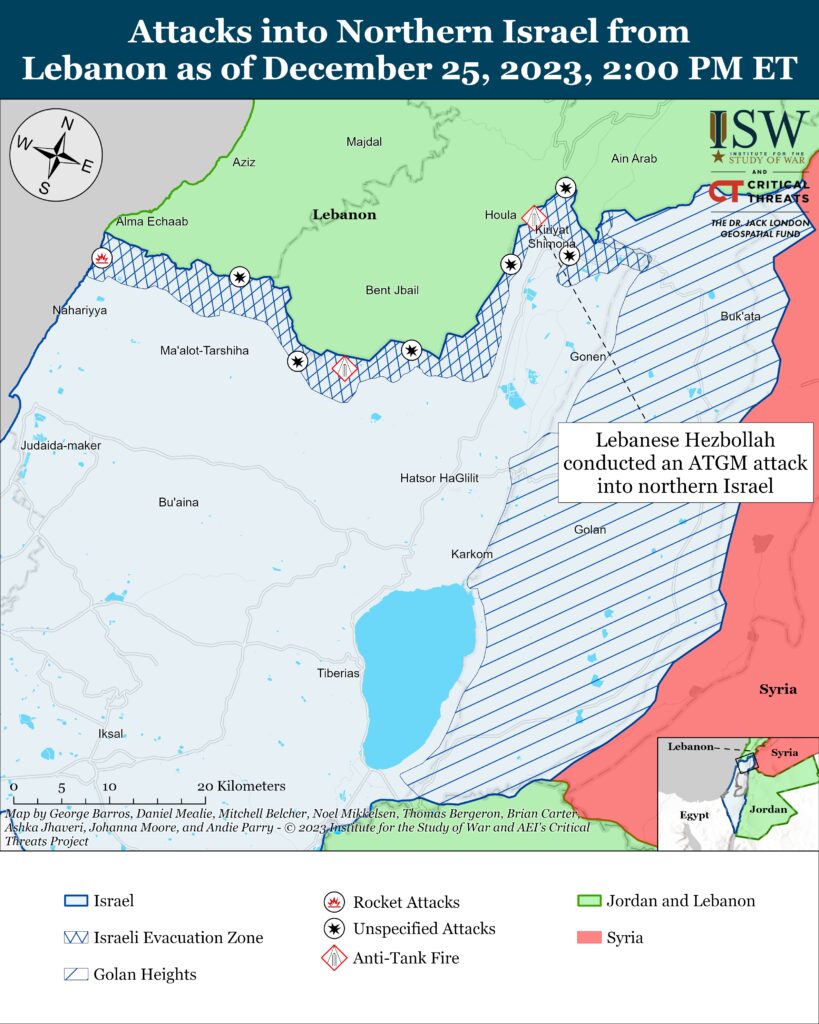
Iran and Axis of Resistance
Axis of Resistance campaign objectives:
Demonstrate the capability and willingness of Iran and the Axis of Resistance to escalate against the United States and Israel on multiple fronts
Set conditions to fight a regional war on multiple frontsThe United States conducted airstrikes targeting three Kataib Hezbollah (KH) drone facilities in Hillah, Babil Province, Iraq, on December 25 in response to a KH drone attack that wounded three US military personnel at Erbil International Airport earlier that day.[lxx] The US airstrikes killed at least one KH member and wounded at least 16 others.[lxxi] Western observers noted that the earlier KH drone attack was one of the “most serious” attacks conducted by Iranian-backed Iraqi militias since the Israel-Hamas war began.[lxxii] The KH attack put one US servicemember in critical condition.[lxxiii] KH has not claimed responsibility for the attack at the time of writing. The Iraqi federal government condemned the US airstrike but also said that the militia attacks against military bases hosting international coalition advisers “violate Iraqi sovereignty.”[lxxiv]
The Popular Mobilization Forces (PMF)—an Iraqi security service containing several Iranian-backed Shia militias—held a funeral for the KH member who was killed in the US airstrikes.[lxxv] Many individuals at the funeral carried PMF flags, while a small number carried Harakat Hezbollah al Nujaba (HHN) flags.[lxxvi] HHN is one of the Iranian-backed Iraqi militias that has led the attacks on US forces in Iraq and Syria since the Israel-Hamas war began. The PMF and KH-affiliated media honored the killed KH member in social media posts.[lxxvii] Iranian-backed Iraqi militia Ashab al Kahf published a statement claiming that the US killing of Iraqi militants increases their determination and resolve to expel US forces.[lxxviii] Ashab al Kahf added that the United States “will not enjoy security and safety throughout our country and the region as long as there is a pulsing vein in us.”
The Islamic Resistance in Iraq—a coalition of Iranian-backed Iraqi militias—claimed responsibility for three attacks targeting US positions in Iraq and Syria on December 25 and 26.
The Islamic Resistance in Iraq claimed a drone attack targeting US forces at al Harir Airbase in Erbil Province, Iraq, on December 25.[lxxix] Al Harir Airbase is located approximately 30 miles northeast of Erbil International Airport.
The Islamic Resistance in Iraq claimed a drone attack targeting US forces at al Omar oilfield in Deir ez Zor Province, Syria, on December 25.[lxxx] The group also claimed a rocket attack targeting US forces at al Shaddadi in Hasakah Province, Syria, on December 26.[lxxxi]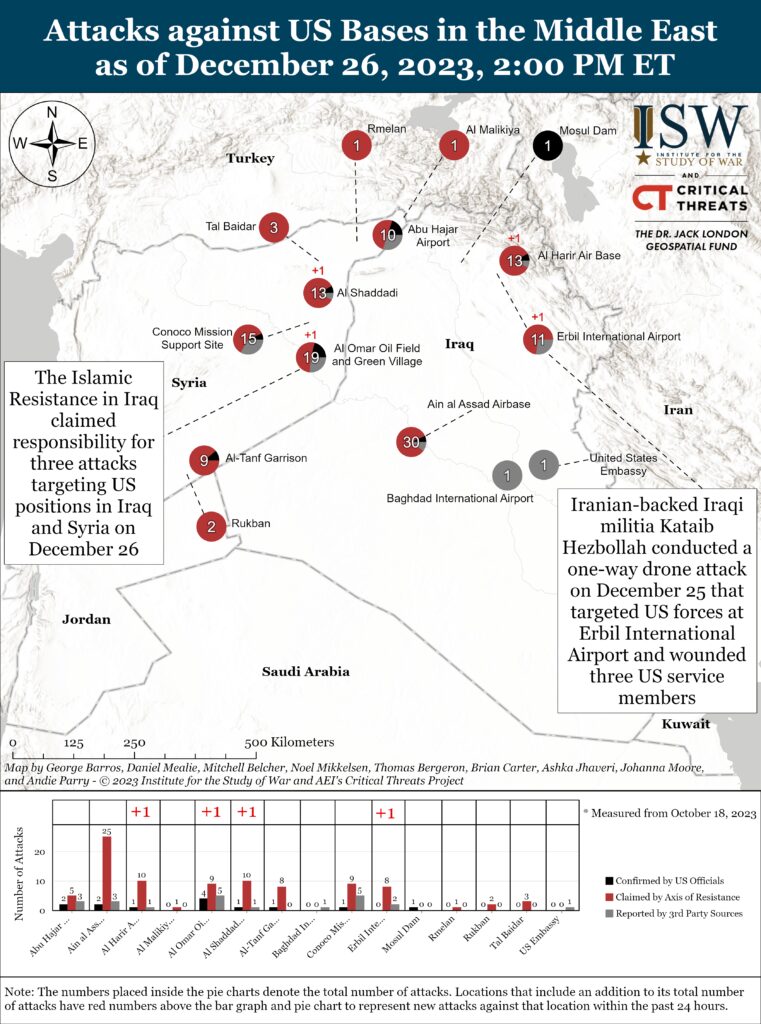
Iranian Supreme National Defense University (SNDU) President IRGC Brigadier General Esmail Ahmadi Moghaddam discussed security and counterterrorism cooperation with Iraqi Popular Mobilization Forces (PMF) Chairman Faleh al Fayyadh in Baghdad on December 26.[lxxxii] Moghaddam and Fayyadh discussed “exchanging experiences and information” between the SNDU and PMF. The meeting between Moghaddam and Fayyadh may have been part of ongoing Iranian efforts to professionalize and institutionalize the PMF. Doing so would consolidate Iranian influence in the Iraqi security sector since the IRGC strongly influences various militias under the PMF. Moghaddam previously served as Iran’s police chief between 2005 and 2015.[lxxxiii] He was instrumental in the Iranian regime’s crackdown on the 2009 Green Movement and was sanctioned by the United States in 2011 for committing human rights abuses.[lxxxiv] Moghaddam also met with Iraqi National Defense University President Lieutenant General Aqeel Mustafa Mahdi, Iraqi Federal Police head Major General Saleh Naser al Ameri, Iraqi National Security Advisor Qasem al Araji, and Iraqi Interior Minister Abdul al Shammari during his visit to Baghdad between December 24 and 26.[lxxxv] Moghaddam may have discussed internal security and his experience suppressing civil unrest during his conversations with Iraqi officials.
Israel was likely responsible for an airstrike on the IRGC military headquarters near Sayyidah Zainab, Syria, on December 25, killing senior IRGC officer Brigadier General Razi Mousavi.[lxxxvi] Mousavi is the most senior IRGC official killed since Israel assassinated Brigadier General Mohsen Fakhri Zadeh near Tehran in November 2020 and the most senior IRGC commander killed in Syria since 2015.[lxxxvii] Iranian officials and state media emphasized Mousavi’s close relationship with former IRGC Quds Force Commander Major General Qassem Soleimani and former IRGC Quds Force Deputy Commander Brigadier General Mohammad Hejazi. They also described him as one of the most important and experienced IRGC commanders in Syria overseeing Iranian support to the Axis of Resistance.[lxxxviii] Western and anti-regime media reported that Mousavi headed Quds Force Unit 2250, which manages Iranian weapons shipments to LH and to Iranian-backed groups in Syria.[lxxxix] Israeli officials told an Israeli journalist that Israel will not accept responsibility for Mousavi’s death.[xc] Israel previously conducted an airstrike on Sayyidah Zainab on December 2, killing two IRGC general officers.[xci] Israel also conducted airstrikes on Sayyidah Zainab on December 10.[xcii]
The IRGC and senior Iranian officials vowed that Iran would retaliate against Israel for Mousavi’s death.[xciii] Western media reported that the IDF was on high-alert and expected large-scale rocket and drone attacks launched from Lebanon and Syria.[xciv] Iran may be responsible for an explosion that occurred near the Israeli Embassy in New Delhi on December 26, which could be part of the Iranian retaliation for Israel killing Mousavi.[xcv] Iran is likely responsible for previous attacks near the Israeli Embassy in New Delhi, which makes this hypothesis plausible. An explosion occurred at the embassy in January 2021. Local authorities discovered a note at the scene that stated that the explosion was in response to Israel killing Fakhri Zadeh in November 2020.[xcvi]
The likely Israeli airstrike that killed Mousavi follows other alleged Israeli action against Iranian interests in recent weeks. An Israel-affiliated hacktivist group “Predatory Sparrow” conducted a large-scale cyberattack against gas pumps throughout Iran on December 18.[xcvii] Iran also blamed Israel for a Balochi Salafi-jihadi insurgent attack on a police station in Sistan and Baluchistan Province on December 16.[xcviii]
The Houthis attacked two vessels in the Red Sea on December 26 as part of the ongoing anti-shipping attack campaign that they and Iran have conducted around the Bab al Mandeb in recent weeks. Houthi military spokesperson Brigadier General Yahya Sarea claimed that the group fired anti-ship missiles at the Liberia-flagged, Swiss-owned cargo ship MSC United after the crew refused orders from Houthi naval forces.[xcix] The missiles did not strike the MSC United, which was traveling from Saudi Arabia to Pakistan.[c] The Houthis falsely claim that they only target ships headed to Israeli ports or owned by Israelis.[ci] The UK Maritime Trade Operations organization announced that two one-way drones exploded near a vessel 50 nautical miles west of Yemen in a separate incident on December 26.[cii] Sarea did not claim responsibility for the second attack, and the attack did not cause damage.[ciii]
The IDF intercepted at least one Houthi drone targeting southern Israel on December 26. The Houthi military spokesperson said that the group launched attack drones at military targets in Eilat and other unspecified locations in Israel.[civ] The IDF stated its fighter jets intercepted a hostile aerial target headed to Israel over the Red Sea.[cv] Egyptian security sources speaking to Reuters stated that an unspecified actor intercepted a drone over the Egyptian Red Sea town of Dahab.[cvi]
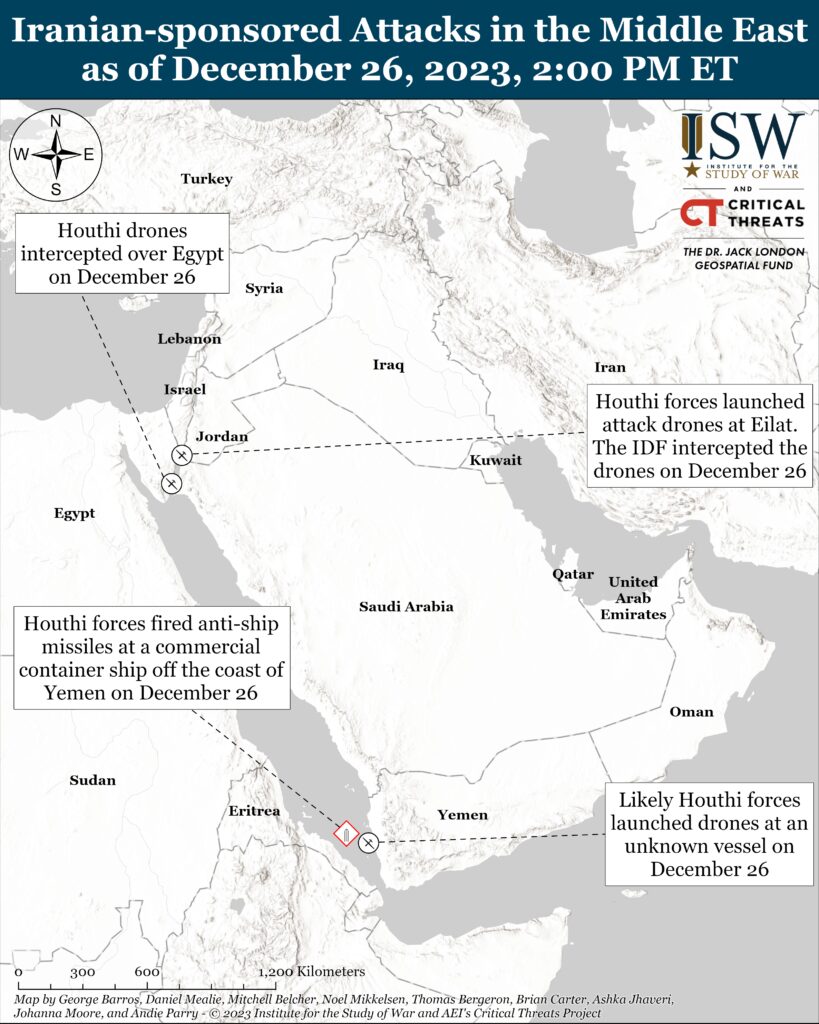
International shipping giant Maersk announced on December 24 it is preparing to resume shipping in the Gulf of Aden and Red Sea since the US established Operation Prosperity Guardian to protect commercial traffic there.[cvii] Maersk halted traffic through the Red Sea on December 15, a day after the Houthis conducted a missile attack targeting one of its container ships near the Bab al Mandeb.[cviii] The United States announced Operation Prosperity Guardian on December 18 to address Houthi attacks on international shipping around the Bab al Mandeb.[cix] The Iranian regime claimed that the US-led coalition was ”collapsing” on December 23.[cx] Maersk’s decision to resume shipping as a result of the coalition refutes the Iranian information operation.
Western media reported on December 26 that a confidential International Atomic Energy Agency (IAEA) report confirmed that Iran has increased its production rate of highly enriched uranium (HEU).[cxi] The report was sent to IAEA member states. CTP-ISW is treating this information with some skepticism, as Western media has previously published inaccurate interpretations of unpublished agency reports.[cxii] The most recent public IAEA reports in November 2023 said that Iran had slowed its enrichment rate of 60 percent HEU.[cxiii] Iran and the United States concluded an informal agreement in August 2023 under which Iran would partially slow down and reverse its nuclear advances in return for the United States unfreezing Iranian financial assets in Qatari banks.[cxiv] The United States reportedly refroze Iranian assets in October 2023 that it had released as part of the agreement.[cxv]
Iranian Foreign Affairs Minister Hossein Amir Abdollahian discussed the Israel-Hamas war and Egyptian-Iranian relations during a phone call with Egyptian Foreign Affairs Minister Sameh Shoukry on December 25.[cxvi] The ministers discussed the need for an immediate ceasefire and for the entry of humanitarian aid into the Gaza Strip.
Abdollahian discussed the Israel-Hamas war and regional maritime security during a phone call with Jordanian Foreign Affairs Minister Ayman Safadi on December 25.[cxvii] Abdollahian said that a ceasefire would ensure the safety of the region. Abdollahian added that Iran is committed to ensuring the freedom of navigation in the Red Sea, Persian Gulf and Indian Ocean, ignoring the fact that Iran has conducted and facilitated repeated attacks against commercial vessels in these areas in recent weeks.
Abdollahian discussed the Israel-Hamas war with Syrian Foreign Affairs Minister Faisal Mekdad in Tehran on December 25.[cxviii] The two emphasized the need for an immediate ceasefire in the Israel-Hamas war. Mekdad was in Tehran to attend the Tehran International Conference on Palestine, which the regime held on December 23.[cxix]
The Russia-led Eurasian Economic Union (EaEU) signed a free trade agreement with Iran on December 25.[cxx] The agreement will eliminate customs duties on almost 90 percent of goods and establish a preferential regime for most of the trade between Russia and Iran. This agreement serves to replace a similar temporary agreement that has been in force since 2019.[cxxi]
 Eurasia Press & News
Eurasia Press & News



